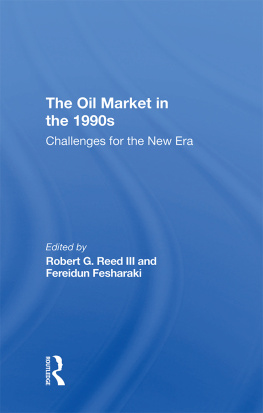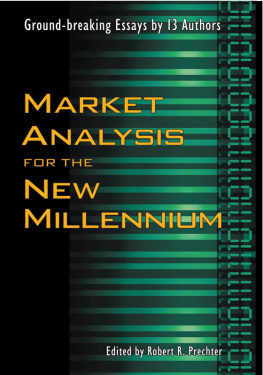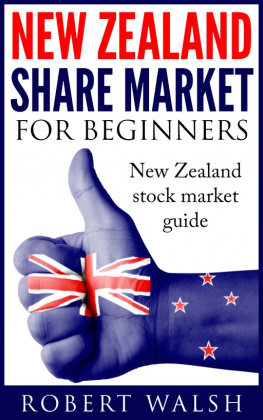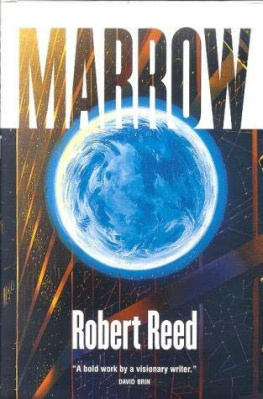The Oil Market in the 1990s
Published in cooperation with Pacific Resources, Inc., and the East-West Center
The Oil Market in the 1990s
Challenges for the New Era
Essays in Honor of John K. Evans
Edited By
Robert G. Reed III
and Fereidun Fesharaki
First published 1989 by Westview Press
Published 2019 by Routledge
52 Vanderbilt Avenue, New York, NY 10017
2 Park Square, Milton Park, Abingdon, Oxon OX14 4RN
Routledge is an imprint of the Taylor & Francis Group, an informa business
Copyright 1989 by the East-West Center
All rights reserved. No part of this book may be reprinted or reproduced or utilised in any form or by any electronic, mechanical, or other means, now known or hereafter invented, including photocopying and recording, or in any information storage or retrieval system, without permission in writing from the publishers.
Notice:
Product or corporate names may be trademarks or registered trademarks, and are used only for identification and explanation without intent to infringe.
Library of Congress Cataloging-in-Publication Data
The Oil market in the 1990s: challenges for the new era / edited by
Robert G. Reed III and Fereidun Fesharaki.
p. cm. (Westview special studies in international
economics and business)
Includes bibliographies and index.
ISBN 0-8133-0819-4
1. Petroleum industry and tradeForecasting. I. Reed, Robert G.
II. Fesharaki, Fereidun. III. Series
HD9560.5.0368 1989
338.2'7282'0724dc19 88-20799
CIP
ISBN 13: 978-0-367-29452-6 (hbk)
Contents
, Robert G. Reed III and Fereidun Fesharaki
, Guy F. Caruso
, Melvin A. Conant
, Fereidun Fesharaki and David T. Isaak
, Paul H. Frankel
, Herman T. Franssen
John H. Lichtblau
, Amory B. Lovins and L. Hunter Lovins
, Alirio A. Parra
, Robert G. Reed III
, M. Silvan Robinson
, Ralph W. Snyder, Jr.
John Elting Treat and Barbara Laflin Treat
, Louis Turner
How do you give a gift to a man who has everything? In the case of our dear friend Jack Evans, this was the very problem we faced. For a man who has given so much for so long, this festschrift by his friends and admirers is but a small token.
A Welshman who emigrated to the United States as a penniless youth, Jack Evans symbolizes the image of a tough go-getter immigrant who became a great success in his professional and personal life. As an entrepreneur, promoter, innovator, and concept man, he has always been full of ideas. In fact, his friends have a hard time keeping up with him! Although a highly successful oilman, he really is an idea man.
Jack Evans started his oil career in 1933 as a trainee for Shell Oil. By the start of World War II, he had become marketing manager for Shell in New England. During the war he was a commissioned officer in the U.S. Army, finally achieving the rank of colonel, and was involved in the allocation of oil supplies to various places in the Latin America theater. After the war, he rejoined Royal Dutch Shell as general manager in Puerto Rico, and after serving in several other overseas assignments, he became the company's representative in Washington, D.C. He retired in the early 1960s and began a career of project promotion and entrepreneurship leading him to become a founder of HIRHawaiian Independent Refinery, Inc.with which he continues to be involved in an advisory capacity.
So many of us often want to express ourselves bluntly to relieve our frustrations. But we don't. Jack does not suffer from this handicap! He is not known to contain himself if he feels strongly about anything. He is a man who speaks his mind. Although a practical man, Jack is blessed with high intellect. He travels around the globe (loves to go to conferences!), and if he likes something he hears, he will follow it up. Most of us are amazed at the flood of letters and documents that Jack can shoot across the globe to get a thought or a message across.
Jack's toughness and outspoken words sometimes might hide his very warm and soft hearthow he gives so generously to worthwhile causes, how he promotes international understanding, and how he tries to help those in need, both with love, moral support, and money. Jack is no pushover. He has earned his money the hard way and he won't just throw it away. But he is extremely generous when he sees a real need.
Jack Evans has touched the lives of many people. His friends have come together to dedicate their thoughts in this book to honor him. For us as editors of this volume, he is a very special friend, a friend whom we have come to love, admire, and depend upon. Jack Evans is a truly amazing manone of a kina man who gives us hope for the future of mankind. Jack and Jean Evans are a true delight to their friends.
Robert G. Reed III
Fereidun Fesharaki
Honolulu, Hawaii
Structural Adjustment in the Oil Industry: Evolutionary Change and an Information Revolution
Guy F. Caruso
The world's largest industryinternational oilhas undergone profound changes since 1973. Change has occurred in all sectors of the industry, from the upstream where crude oil is discovered and produced to the downstream areas of refining and marketing. International oil has gone from an industry dominated by relatively few large, fully integrated, multinational oil companies to one in which governments in both producing and consuming countries play important roles and a large number of smaller buyers and sellers have entered the market. Nevertheless, large oil companies have maintained a central role in exploration and development, investments outside the Organization of Petroleum Exporting Countries (OPEC), and in the refining and marketing of refined products in Organization for Economic Cooperation and Development (OECD) countries.
This chapter reviews some of those changes that have occurred since the early 1970s. Most changes in the industry's structure have been evolutionary, with reasonably smooth adjustments having taken place. There is one area in which change has been revolutionary: oil market information. Information available to industry participants and analysts has proliferated since the mid-1970s.
Some, if not all, of the information explosion was stimulated by governmentsboth consumers and producers. In 1973-1974 OECD governments found themselves in the unacceptable position of not having adequate, timely, and accurate information on oil supply, demand, and prices. The experience of 1978-1979 showed that although oil information had improved, much work remained. Since 1981, during a period of declining crude oil prices, governments of oil-producing countries became increasingly interested in better information as OPEC countries sought to set and enforce production quotas.
Role of Major Oil Companies
The role of the large international oil companiesthe so-called majors (Exxon, Royal Dutch/Shell, Chevron [formerly Standard Oil of California and Gulf Oil], Texaco, British Petroleum, and Mobil Oil)has changed substantially during the past decade. There are both myths and realities about the structural changes that have occurred and their implications.













